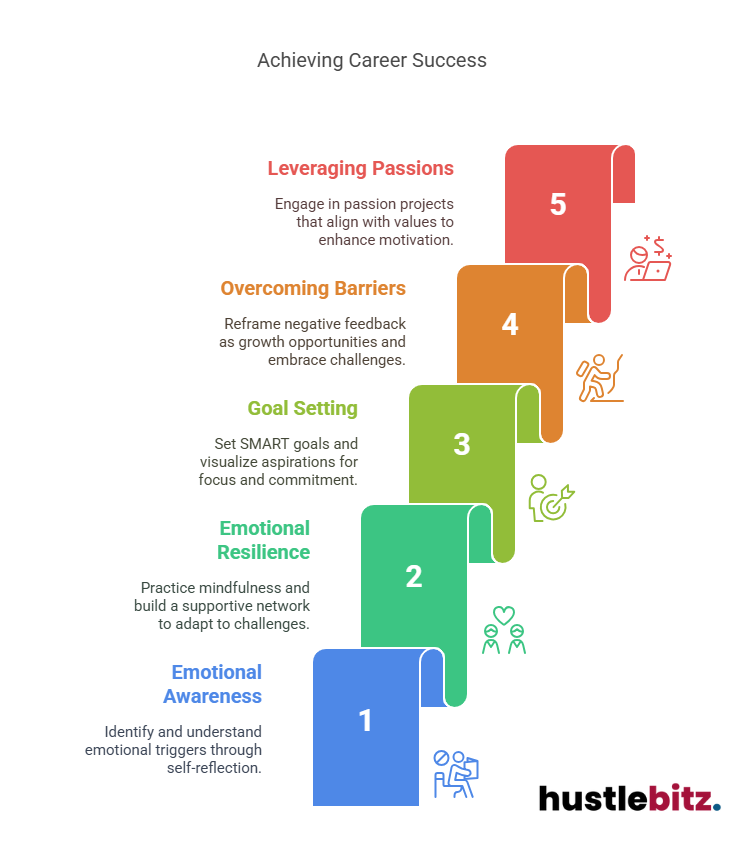Harnessing emotional motivation involves understanding intrinsic drives that lead to career satisfaction. Start by identifying your emotional triggers through self-reflection techniques, such as journaling. Cultivating a positive mindset is crucial; utilize affirmations and gratitude practices to enhance focus on your achievements. Set meaningful career goals using SMART criteria, while building emotional resilience through mindfulness and supportive networks. Embrace your passions, aligning them with your work for heightened engagement. Overcome emotional barriers like fear of failure by reframing setbacks as growth opportunities. Explore these strategies further to unlock your full potential and foster long-term career success.
Key Takeaways
- Identify and understand your emotional triggers through self-reflection techniques like journaling to enhance emotional awareness.
- Cultivate emotional resilience by practicing mindfulness and maintaining a supportive network to adapt to workplace challenges.
- Set SMART goals and visualize your aspirations to maintain focus and commitment towards career success.
- Overcome emotional barriers, such as fear of failure, by reframing negative feedback as growth opportunities and embracing challenges.
- Leverage your passions through passion projects that align with your values, enhancing intrinsic motivation and workplace engagement.

Understanding Emotional Motivation

Understanding emotional motivation involves recognizing the underlying feelings and drives that influence our behaviors and decisions in the workplace. This process is essential for enhancing emotional awareness and developing emotional intelligence, which are critical components of effective leadership and collaboration. Emotional motivation is deeply intertwined with intrinsic motivation, where personal values and beliefs drive individuals to pursue career fulfillment beyond external rewards.
To cultivate a profound understanding of emotional motivation, professionals can employ self-reflection techniques that encourage introspection about their emotional states and motivations. By examining one’s own emotional landscape, individuals can identify the motivations that propel them toward certain goals and behaviors. This self-awareness not only facilitates personal growth but also enhances empathy development, enabling professionals to better understand and connect with their colleagues.
Furthermore, motivation theories provide a framework for understanding how workplace dynamics can influence emotional motivation. For instance, recognizing the role of emotional regulation in managing stress and fostering resilience allows individuals to navigate complex workplace interactions more effectively. By mastering these skills, professionals can align their emotional drives with their professional objectives, thereby fostering an environment conducive to collaboration and innovation.
Ultimately, a nuanced understanding of emotional motivation empowers individuals to harness their emotional intelligence effectively, leading to improved performance and greater satisfaction in their careers. By prioritizing emotional awareness and regulation, professionals can create a more fulfilling work experience that aligns with their intrinsic motivations and personal values, thereby enhancing overall career success.
Identifying Your Emotional Triggers

Identifying emotional triggers is crucial for professionals seeking to enhance their emotional intelligence and navigate workplace challenges effectively. By developing emotional awareness, individuals can recognize the specific stimuli—whether environmental cues or interpersonal interactions—that provoke distinct emotional responses. This trigger identification process is essential for understanding one’s response patterns, allowing professionals to discern when emotions may negatively influence decision-making or performance.
Employing self-reflection techniques can significantly aid in this endeavor. Journaling, for example, can facilitate stress recognition and provide insights into how personal values shape emotional reactions. As professionals reflect on their experiences, they can identify recurring situations that lead to heightened emotions, whether positive or negative. Understanding these triggers enables individuals to cultivate emotional regulation strategies tailored to their unique circumstances.
Furthermore, recognizing mood influences, including external factors such as workplace dynamics or project deadlines, allows professionals to implement proactive strategies that mitigate stress and enhance overall productivity. By being aware of the conditions that disrupt emotional balance, professionals can proactively adjust their environments or behaviors, fostering a more conducive atmosphere for success.
Ultimately, mastering the art of identifying emotional triggers equips individuals with the tools necessary to transform challenges into opportunities. By leveraging emotional intelligence, professionals can navigate their careers with resilience and clarity, ensuring that they remain aligned with their personal values while pursuing their goals.
Setting Meaningful Career Goals

Building on the awareness gained from recognizing emotional triggers, setting meaningful career goals allows professionals to align their aspirations with their values, ultimately enhancing motivation and satisfaction in the workplace. A structured approach, such as SMART goal setting, ensures that goals are Specific, Measurable, Achievable, Relevant, and Time-bound, thus fostering clarity and focus.
To effectively harness intrinsic motivation factors, it is crucial to engage in goal visualization techniques, which can vividly illustrate desired outcomes and reinforce commitment. Career aspiration mapping is another powerful tool that helps professionals delineate their long-term versus short-term goals, ensuring that immediate actions align with broader aspirations.
Moreover, the role of accountability partners cannot be understated; they provide support and encouragement, helping individuals stay on track and reassess as necessary. Celebrating small wins along the journey not only boosts morale but also reinforces the value of persistence in goal attainment.
Adjusting goals flexibly is equally important, as the professional landscape is dynamic and may require recalibration of objectives. The impact of mentorship can further amplify this process, offering insights and guidance that align goals with personal and organizational values.
Cultivating a Positive Mindset

Cultivating a positive mindset serves as a foundational element for achieving sustained career success and personal fulfillment. A positive mindset enables individuals to navigate challenges with resilience and adaptability, fostering an environment conducive to growth and innovation.
Essential to this process are positive affirmations, which empower individuals by reinforcing their self-belief and capacity for success. Incorporating a gratitude practice can further enhance this mindset, allowing professionals to focus on their achievements and the support they receive from others.
Mindfulness techniques, such as meditation and conscious breathing, can mitigate stress and promote clarity, enabling better decision-making and enhanced focus. Coupled with self-compassion exercises, individuals can cultivate resilience against self-doubt, recognizing that setbacks are integral to the journey of growth.
Visualization strategies play a crucial role in maintaining an optimistic outlook. By vividly imagining their desired outcomes, individuals can align their actions with their aspirations, reinforcing a growth mindset that embraces learning and exploration.
Moreover, effective stress management and work-life balance are vital components that ensure sustained motivation and productivity.
Building Emotional Resilience
Emotional resilience is the ability to adapt to stress and adversity, enabling individuals to maintain their focus and performance in the face of challenges.
Building emotional resilience requires a multifaceted approach that encompasses emotional adaptability and effective stress management. By incorporating specific coping strategies, individuals can navigate the complexities of their professional lives with greater ease.
To cultivate emotional resilience, consider the following strategies:
- Resilience Training: Engage in targeted programs that enhance emotional regulation and coping skills. These trainings equip you with techniques to confront challenges with a growth mindset.
- Mindful Awareness: Practice mindfulness to improve self-awareness and emotional adaptability. Mindful awareness fosters a deeper understanding of your emotional responses, enabling you to respond rather than react to stressors.
- Support Networks: Build and nurture a robust support network. Connecting with peers and mentors provides not only emotional backing but also diverse perspectives that can enhance problem-solving and resilience.
Additionally, self-care practices such as reflective journaling can facilitate emotional processing and growth. By regularly documenting thoughts and feelings, you can identify patterns that inform your emotional responses.
Ultimately, integrating these strategies into your daily routine enhances your ability to manage stress effectively and cultivate a resilient mindset, paving the way for sustained career success.
Leveraging Passion for Performance

Harnessing passion as a driving force can significantly enhance individual performance and satisfaction in the workplace. When employees engage in passion projects that align with their personal values, they unlock intrinsic motivation, which fuels their commitment and creativity. This emotional alignment not only supports skill development but also fosters a sense of career fulfillment, as individuals see their unique contributions valued within the organizational framework.
Moreover, creative expression through passion projects can invigorate workplace engagement, allowing employees to bring their authentic selves to their roles. This authenticity promotes a culture of innovation, where team collaboration flourishes. By encouraging individuals to pursue their passions, organizations can effectively manage energy levels, transforming the workplace into a vibrant ecosystem where enthusiasm and productivity thrive.
To leverage passion for performance, leaders must create an environment that nurtures these interests. This includes providing opportunities for employees to engage in projects that resonate with their personal motivations while aligning with organizational goals. By fostering a culture that celebrates passion, businesses can significantly enhance overall performance metrics.
Overcoming Emotional Barriers
While fostering passion can drive performance, addressing and overcoming emotional barriers is equally important for individuals to reach their full potential in the workplace.
Emotional barriers such as fear of failure, self-doubt, and imposter syndrome can create significant obstacles to career advancement. These barriers often manifest as workplace stress, emotional exhaustion, and communication breakdowns, making it crucial to identify strategies to overcome them.
To effectively navigate these challenges, consider the following approaches:
- Acknowledge and Reframe Negative Feedback: Instead of viewing criticism as a personal attack, interpret it as an opportunity for growth. This shift can alleviate perfectionism issues and mitigate the fear of failure.
- Develop Resilience Against Self-Doubt: Practice self-compassion and recognize that everyone experiences moments of uncertainty. By fostering a growth mindset, individuals can learn to embrace challenges rather than avoid them, thereby reducing conflict avoidance and change resistance.
- Create a Supportive Network: Surround yourself with colleagues who encourage open communication and constructive discussions. This network can help combat emotional exhaustion and provide perspective, especially when facing workplace stress.
Final Thoughts
Harnessing emotional motivation for career success is an empowering journey that requires self-awareness, resilience, and intentional action. By identifying emotional triggers, setting meaningful career goals, and cultivating a positive mindset, professionals can unlock their intrinsic motivation and drive toward sustained success. Building emotional resilience and leveraging passion for performance further enhances engagement and personal fulfillment in the workplace. Overcoming emotional barriers, such as fear of failure or self-doubt, is key to realizing one’s full potential. Ultimately, aligning emotional motivation with career aspirations paves the way for long-term satisfaction and growth. By embracing these strategies, individuals can thrive both personally and professionally.




